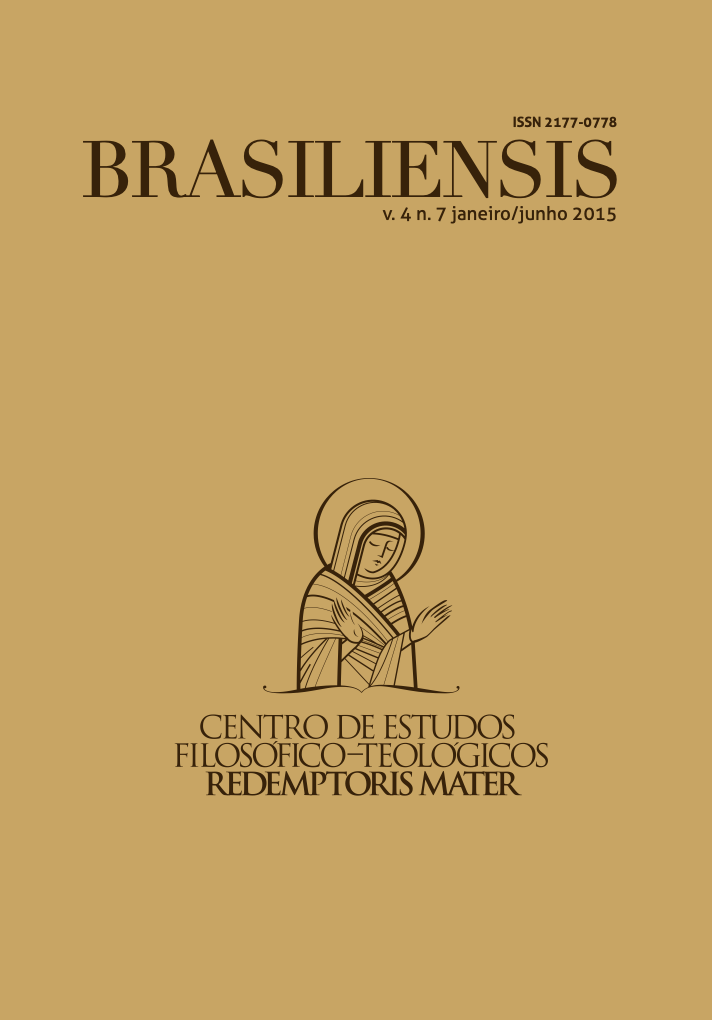Uma ética sem Deus é possível?
Contenu principal de l'article
Résumé
Os estados laicistas vêm de um idealismo gnosiológico fortemente ligado ao pensamento agnóstico e ateu autoproclamado que diz prescindir da religião, pois esta não “deve influir de modo algum na conduta pública, ou mesmo externa, da pessoa”. Partindo dessas considerações, pretende-se desvelar a interrogação inicial, fundamentada na razão humana e não na fé para chegar a uma ética comum, refletindo especialmente sobre quatro propostas: 1) a Declaração Universal dos Direitos Humanos; 2) o projeto de uma “ética mundial”, a ser construída por meio de fóruns internacionais de religiões e culturas; 3) o modelo positivista; e 4) a “ética da discussão”, apontando algumas conquistas e limitações de cada uma delas.
Details de l'article

Ce travail est disponible sous licence Creative Commons Attribution - Pas d'Utilisation Commerciale - Pas de Modification 4.0 International.
La licence Creative Commons Attribution (CC BY) est la licence Creative Commons la plus permissive. Elle permet à d'autres de distribuer, remixer, adapter et construire sur votre œuvre, même à des fins commerciales, à condition de vous attribuer le crédit pour la création originale.
Comment citer
Références
AGOSTINHO, Santo, Bispo de hipona. A cidade de Deus. Petrópolis: Vozes, 1990. ARISTÓTELES. Ética a Nicómaco. São Paulo: Poética, 1973.
BENSON, Robert Hugh. O senhor do mundo. São Paulo: Ecclesiae, 2013. CHESTERTON, Gilbert Keith. Ortodoxia. São Paulo: LTR, 2001.
COMISSÃO TEOLÓGICA INTERNACIONAL (CTI). Em busca de uma ética universal: novo olhar sobre a lei natural. Roma: 2009. Disponivel em: . Acesso em: 19 fev. 2015.
CONCÍLIO VATICANO, 1., 1962-1965. Documentos do Vaticano I: contituções, decretos, delcarações. Petrópolis: Vozes, 1966.
CONCÍLIO VATICANO, 2., 1962-1965. Documentos do Vaticano II: contituções, decretos, delcarações. Petrópolis: Vozes, 1967.
CONGREGAÇÃO PARA A DOUTRINA DA FÉ (CDF). Nota outrinal sobre algumas questões relativas à participação e comportamento dos católicos na vida política. Roma, 24 nov. 2002. Disponivel em: <http://www.vatican.va/roman_ curia/congregations/ cfaith/documents/rc_con_cfaith_doc_20021124_ politica_po.html>. Acesso em: 19 fev. 2015.
FABRO, Cornelio. Ludwig Feuerbach: La Esencia del Cristianismo. Toledo: Critica Filosófica, 1977.
GILSON, Étienne. Deus e a filosoia. Lisboa: Edições 70, 2003.
——. El realismo metódico. Madrid: Encuantro, 1997.
GRISEZ, Germain. O primeiro princípio da razão prática. Um comentário à Summa theologiae, 1-2, Questão 94, artigo 2. Direito GV 6, v. 3, n. 2, p. 179-218, jul.-dez. 2007. Disponivel em: <http://direitosp.fgv.br/sites/direitosp. fgv.br/files/rd-06_10_pp.179-218_o_primeiro_principio_da_razao_ pratica_germain_grisez.pdf>. Acesso em: 20 fev. 2015
IGREJA CATÓLICA. Catecismo da Igreja Católica. Petrópolis: Vozes; São Paulo: Paulinas, Loyola, Ave-Maria, 1993.
IGREJA CATÓLICA. Papa (1978-2005: João Paulo II). Carta encíclica, Veritatis splendor, do Sumo Pontífice João Paulo II, a todos os bispos da Igreja Católica, sobre algunas questões fundamentais do ensinamento moral da Igreja. Roma: [s.l.], 6 ago. 1993. Disponivel em: <http://w2.vatican.va/content/john-paul-ii/pt/encyclicals/documents/hf_jp-ii_enc_06081993_veritatis-splendor. html>. Acesso em: 20 fev. 2015.
JACOBINA, Paulo. Pessoa, cidadania e dignidade. Zenit, Brasília, 10 maio 2013. Disponivel em: <http://www.zenit.org/pt/articles/pessoa-cidadania-e-dignidade>. Acesso em: 27 fev. 2015.
KELSEN, Hans. O problema da justiça. São Paulo: Martins Fontes, 2003. MACINTYRE, Alasdair. Depois da virtude. Bauru: EDUSC, 2001.
——. Justiça de quem. Qual racionalidade. São Paulo: Loyola, 1991. NIETZSCHE, Friedrich. Assim falou Zaratustra. São Paulo: Companhia das Letras, 2011.
PIEPER, Josef. Luz inabarcável: o elemento negativo na filosofía de Tomás de Aquino. Disponivel em: <http://www.hottopos.com/convenit/jp1.htm#1>. Acesso em: 14 nov. 2013.
PRZYWARA, Erich. Analogia entis. Valparaíso do Chile: Veritas, 2012. RATZINGER, Joseph. Fé, verdade e tolerância. São Paulo: Instituto Brasleiro de Filosofía e Ciência «Raimundo Lúlio», 2007.
REILLY, Robert. he Closing of the Muslim Mind. Wilington, Delaware: Intercollegiate Studies Institute, 2010.
ROCCELLA, Eugenia; SCARAFFIA, Lucetta. Contra o cristianismo: a ONU e a União Europeia como nova ideologia. Campinas: Ecclesiae, 2014.
SOLOVIEV, Vladimir. Breve conto sobre o Anticristo. São Paulo: Antroposófica, 2003.
TOMÁS, de Aquino. Suma teológica. São Paulo: Loyola, 2006.
ZILLES, Urbano. Filosofia da religião. São Paulo: Paulus, 2010.

